
Bal Gangadhar Tilak,endeared as Lokmanya,was an Indian nationalist,teacher,and an independence activist. He was one third of the Lal Bal Pal triumvirate. The British colonial authorities called him "The father of the Indian unrest". He was also conferred with the title of "Lokmanya",which means "accepted by the people as their leader". Mahatma Gandhi called him "The Maker of Modern India".

The non-cooperation movement was a political campaign launched on August 1,1920,by Mahatma Gandhi to have Indians revoke their cooperation from the British government,with the aim of persuading them to grant self-governance.
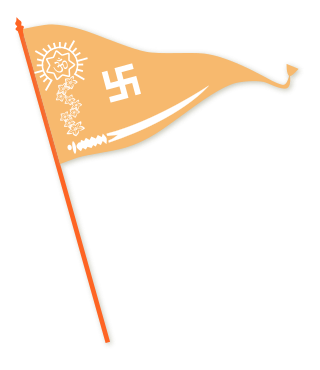
Akhil Bharat Hindu Mahasabha is a Hindu nationalist political party in India.
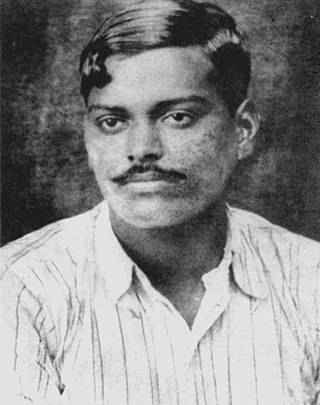
Chandra Shekhar Sitaram Tiwari,popularly known as Chandra Shekhar Azad,was an Indian revolutionary who reorganised the Hindustan Republican Association (HRA) under its new name of Hindustan Socialist Republican Association (HSRA) after the death of its founder,Ram Prasad Bismil,and three other prominent party leaders,Roshan Singh,Rajendra Nath Lahiri and Ashfaqulla Khan. He hailed from Bardarka village in Unnao district of United Provinces and his parents were Sitaram Tiwari and Jagrani Devi. He often used the pseudonym "Balraj" while signing pamphlets issued as the commander-in-chief of the HSRA.

Purushottam Das Tandon was a freedom fighter from Allahabad,Uttar Pradesh,India. He is widely remembered for his opposition to the partition of India,as well as efforts in achieving the Official Language of India status for Hindi. He was customarily given the title Rajarshi. He was popularly known as UP Gandhi. He was awarded the Bharat Ratna,India's highest civilian award,in 1961.
Bhiwani is a city and a municipal council in Bhiwani district in the state of Haryana. Besides being a seat of spiritual learning,the city is at the centre of regional politics and hometown of three former Haryana chief ministers:Bansi Lal,Banarsi Das Gupta and Hukum Singh. It is located 128 km west of national capital New Delhi.
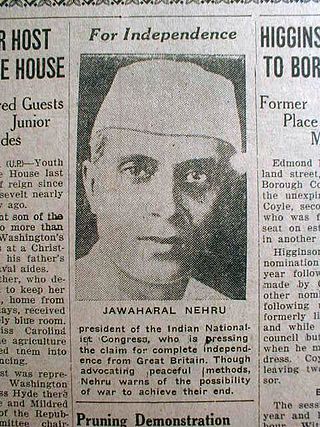
The Declaration of Purna Swaraj was a resolution which was passed in 1930 because of the dissatisfaction among the Indian masses regarding the British offer of Dominion status to India. The word Purna Swaraj was derived from Sanskrit पूर्ण(Pūrṇa) 'Complete',and स्वराज(Svarāja) 'Self-rule or Sovereignty',or Declaration of the Independence of India,it was promulgated by the Indian National Congress,resolving the Congress and Indian nationalists to fight for Purna Swaraj,or complete self-rule/total independence from the British rule.

Mahatma Gandhi Kashi Vidyapith is a public university located in Varanasi,Uttar Pradesh,India. Established in 10 February 1921 as Kashi Vidyapith and later renamed,it is administered under the state legislature of the government of Uttar Pradesh. It got University status in 1974 as Deemed to be University and State University status in 2009 by The Uttar Pradesh State Universities (Amendment) Act,2008. The university has more than 400+ affiliated colleges spread over six districts. It is one of the largest state universities in Uttar Pradesh,with hundreds of thousands of students,both rural and urban. It offers a range of professional and academic courses in arts,science,commerce,agriculture science,law,computing and management.
In India,Flag Satyagraha is a campaign of peaceful civil disobedience during the Indian independence movement that focused on exercising the right and freedom to hoist the nationalist flag and challenge the legitimacy of the British Rule in India through the defiance of laws prohibiting the hoisting of nationalist flags and restricting civil freedoms. Flag Satyagrahas were conducted most notably in the city of Jabalpur and Nagpur in 1923 but also in many other parts of India.

Ravishankar Shukla was a leader of the Indian National Congress,Indian independence movement activist,the Premier of the Central Provinces and Berar from 27 April 1946 to 25 January 1950,first Chief Minister of the reorganised Madhya Pradesh state from 1 November 1956 until his death on 31 December 1956,he was elected from Saraipali in Madhya Pradesh. He also served as Member of Constituent Assembly of India from Central Provinces and Berar.
Hindu Revolution is a term in Hindu nationalism referring to a sociopolitical movement aiming to overthrow untouchability and casteism to unified social and political community to create the foundations of a modern nation.

Madhav Shrihari Aney;popularly referred to as Loknayak Bapuji Aney or Bapuji Aney,was an ardent educationist,freedom fighter,statesman,a modern Sanskrit poet and a politician. He was also conferred with the title of "Loknayak Bapuji",which means "The People's Leader and Respected Father". He was one of the founders of the Congress Nationalist Party. He was first among the eminent disciples of Lokmanya Tilak such as N C Kelkar,Kakasaheb Khadilkar,Gangadhar Deshpande,Dr B S Munje,Abhyankar,T B Paranjpe and Vaman Malhar Joshi,who walked in the footsteps of Tilak. Accepting the leadership of Mahatma Gandhi on the death of Bal Gangadhar Tilak. Aney persuaded his colleagues to see the writing on the wall. At the same time he was not blind in his loyalty. He disapproved Congress throwing itself in Khilafat Movement and warned against excessive wooing of Muslims at the cost of national interests. He regarded unity at any price as elusive and dangerous. Since the best safeguard for the minority was the goodwill of the majority. He never permitted his critical faculties to be blurred by emotion. Mahatma Gandhi admiring his calm logic,confided in him and often sought his counsel. He was chosen to arbitrate the disputes between Subhash Chandra Bose and Jatindra Mohan Sengupta. He was never a breaker or a destroyer but was always a cementing factor believing in synthesis and not in segregation.
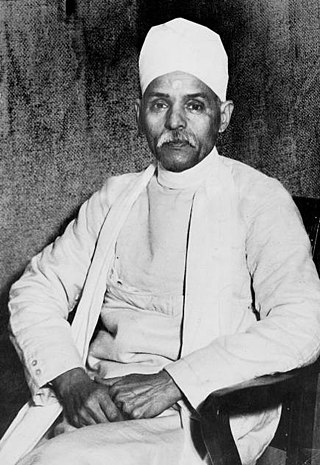
Madan Mohan Malaviya was an Indian scholar,educational reformer and politician notable for his role in the Indian independence movement. He was president of the Indian National Congress two times and the founder of Akhil Bharat Hindu Mahasabha. He was addressed as Pandit,a title of respect.

Maniben Patel was an Indian independence movement activist and a Member of the Indian parliament. She was the daughter of freedom fighter and post-Independence Indian leader Sardar Vallabhbhai Patel. Educated in Bombay,Patel adopted the teachings of Mahatma Gandhi in 1918,and started working regularly at his ashram in Ahmedabad.
Jayant Shridhar Tilak,generally referred to as Jayant-rao Tilak,was a politician from Indian National Congress and was a member of the Parliament of India representing Maharashtra in the Rajya Sabha,the upper house of the Indian Parliament. He was also a Member of the Maharashtra Legislative Council. He was the chairman of the house for 16 years.
The Surat Split was the splitting of the (INC) Indian National Congress into two groups - the Early Nationalists aka Moderates and Radicals aka Extremists - at the Surat session in 1907.
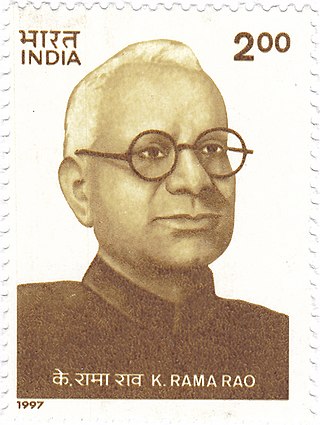
Kotamaraju Rama Rao was an Indian journalist,editor,and freedom fighter. He was the first editor of National Herald,the English-language newspaper established by Jawaharlal Nehru. He was elected to the first Rajya Sabha as a Congress nominee from the undivided state of Madras in 1952. He was the first-ever advisor on 'Plan Publicity' to the Nehru government in 1956 and also served as a member of the Press Council of India and Vice-Chairman of Working Journalists Union.

Deshbandhu Gupta,also known as Lala Deshbandhu Gupta,was an Indian freedom fighter,politician,and journalist. He served as a member of the Punjab Provincial Assembly,having won the 1937 election representing the Indian National Congress. He was also a member of the Constituent Assembly of India.
Gangadharrao Balkrishna Deshpande also known as Lion of Karnataka,Khadi Bhageeratha of Karnataka,was an Indian activist who was the leader of the Indian independence movement against British colonial rule from Belgaum. He was the right-hand man of both Lokamanya Tilak and Mahatma Gandhi in succession. Deshpande considered Lokamanya Tilak as his Guru. Deshpande served as Chairman of Karnataka branch of All-India Spinners' Association,and the All India Village Industries Association for some years. Deshpande was largely responsible for the installation of Premier of Bombay,B. G. Kher.
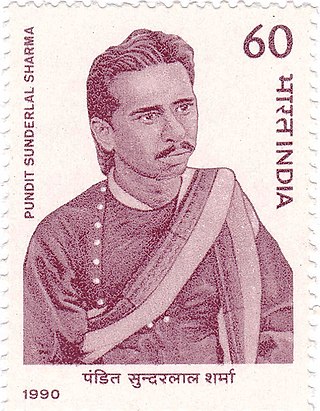
Pandit Sundarlal Sharma was a key figure in the independence movement from Chhattisgarh. He was largely responsible for ushering in political and social consciousness to Chhattisgarh. In 1920,he started the canal satyagraha,also known as the Nahar satyagraha,at a village called Kandel in Dhamtari Tehsil. Chhattisgarh has a university in the name of Pandit Sundarlal Sharma.













